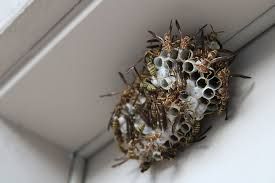
Wasp Removal
Wasps are a common insect in Tampa, Florida, known for their distinctive stinging ability and nesting behaviors. While they play a role in natural ecosystems, wasps can pose various challenges and risks to residents in urban and suburban environments. Understanding the effects of wasps is essential for implementing effective pest management strategies and promoting safety for residents.
Sting Risk
One of the primary concerns with wasps is their ability to sting, which can be painful and potentially dangerous, especially for individuals allergic to their venom. Common wasp species in Tampa, such as paper wasps and yellowjackets, are territorial and may sting in defense of their nests or when disturbed. Managing wasp populations near homes reduces the risk of stings and promotes safety for residents.
Allergic Reactions
For individuals allergic to wasp venom, stings can trigger severe allergic reactions (anaphylaxis) requiring immediate medical attention. Symptoms may include swelling, difficulty breathing, rapid heartbeat, and dizziness. Residents with known allergies to insect stings should carry emergency medication (epinephrine auto-injectors) and take precautions to avoid encounters with wasps to minimize health risks.
Nesting Sites
Wasps often build nests in protected locations near residential properties, such as under eaves, in attics, behind shutters, or within wall voids. Nesting sites provide shelter and protection for wasp colonies but can lead to conflicts with homeowners due to proximity to living spaces. Identifying and removing wasp nests promptly reduces the likelihood of stings and property damage.
Property Damage
Wasps may cause structural damage to homes and buildings when constructing nests or expanding their colonies. They chew wood fibers to create nest materials, potentially compromising wooden structures, siding, or outdoor furniture. Addressing nest-related damage promptly helps preserve property integrity and reduces maintenance costs for homeowners in Tampa.
Pest Control Challenges
Controlling wasp populations can be challenging without proper knowledge and equipment. DIY attempts to remove nests or treat wasp infestations may increase the risk of stings and exacerbate pest control issues. Professional pest control services in Tampa offer expertise in identifying wasp species, locating nests, and implementing safe and effective management strategies to protect residents and properties.
Food Source Contamination
Wasps scavenge for food sources such as sugary substances, meats, and ripe fruits, potentially contaminating outdoor dining areas or residential kitchens. Their presence near food sources can lead to sanitation concerns and food safety risks for residents. Implementing proper waste management practices and securing food items minimizes attraction to wasps and reduces the risk of food contamination.
Outdoor Activities Disruption
Wasps' presence near outdoor recreational areas, gardens, or swimming pools can disrupt residents' enjoyment of outdoor activities. Fear of stings or encounters with aggressive wasps may limit outdoor leisure time and affect quality of life, especially during peak wasp activity periods in Tampa's warm climate. Implementing preventive measures and safe outdoor practices promotes enjoyable living environments.
Psychological Impact
Persistent wasp activity near homes or frequent encounters with stinging incidents can cause psychological stress and anxiety for residents in Tampa. Fear of wasps and anxiety about potential stings may affect daily routines, outdoor activities, and overall well-being. Addressing wasp infestations promptly and implementing effective pest management strategies alleviate concerns and promote peace of mind for residents.
Environmental Impact
Wasps play a role in natural ecosystems by preying on insects and pollinating plants. However, their presence in urban and suburban environments can disrupt ecological balance and compete with native wildlife for resources. Balancing pest control efforts with conservation considerations ensures sustainable management of wasp populations while minimizing impacts on local ecosystems in Tampa.
Community Safety Measures
Educating residents about wasp behavior, sting prevention, and emergency response protocols promotes community safety and preparedness in Tampa. Public awareness campaigns, workshops, and informational materials raise awareness about wasp-related risks and effective pest management practices. Building community resilience against wasp impacts enhances public safety and fosters collaborative efforts in urban wildlife management.
Conclusion
In conclusion, wasps have diverse effects on residents in Tampa, Florida, ranging from sting risks and property damage to environmental considerations and psychological impacts. Addressing these effects requires proactive pest management strategies, community education, and collaboration among residents, pest control professionals, and local authorities. By promoting safety measures and responsible pest management practices, Tampa residents can mitigate risks associated with wasp encounters, protect property integrity, and enhance quality of life in their communities.

